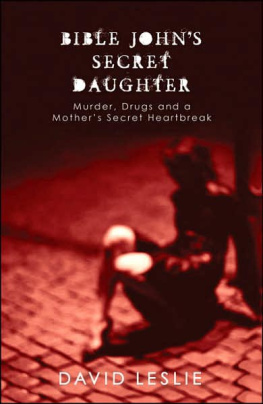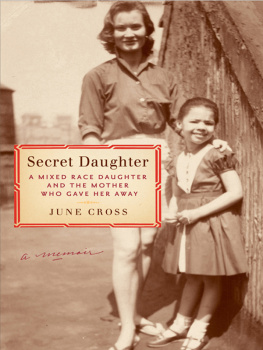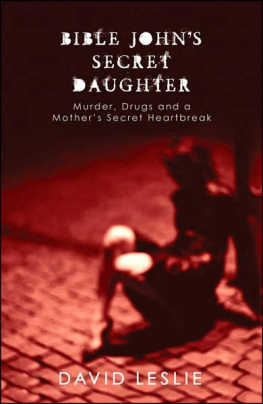Shilpi Somaya Gowda - Secret Daughter
Here you can read online Shilpi Somaya Gowda - Secret Daughter full text of the book (entire story) in english for free. Download pdf and epub, get meaning, cover and reviews about this ebook. year: 2010, publisher: William Morrow, genre: Prose. Description of the work, (preface) as well as reviews are available. Best literature library LitArk.com created for fans of good reading and offers a wide selection of genres:
Romance novel
Science fiction
Adventure
Detective
Science
History
Home and family
Prose
Art
Politics
Computer
Non-fiction
Religion
Business
Children
Humor
Choose a favorite category and find really read worthwhile books. Enjoy immersion in the world of imagination, feel the emotions of the characters or learn something new for yourself, make an fascinating discovery.
- Book:Secret Daughter
- Author:
- Publisher:William Morrow
- Genre:
- Year:2010
- Rating:4 / 5
- Favourites:Add to favourites
- Your mark:
- 80
- 1
- 2
- 3
- 4
- 5
Secret Daughter: summary, description and annotation
We offer to read an annotation, description, summary or preface (depends on what the author of the book "Secret Daughter" wrote himself). If you haven't found the necessary information about the book — write in the comments, we will try to find it.
Secret Daughter — read online for free the complete book (whole text) full work
Below is the text of the book, divided by pages. System saving the place of the last page read, allows you to conveniently read the book "Secret Daughter" online for free, without having to search again every time where you left off. Put a bookmark, and you can go to the page where you finished reading at any time.
Font size:
Interval:
Bookmark:
For my parents
for giving much in their lives
so that anything might be possible in mine
H E CLUTCHES THE WORN SLIP OF PAPER IN HIS HAND, TRYING TO compare the letters written there to the red sign hanging on the door in front of him. Looking back and forth from the paper to the door several times, he is careful not to make a mistake. Once he feels certain, he presses the bell, and a shrill ring echoes inside. While he waits, he runs his palm over the brass plaque next to the door, feeling the ridges of the raised letters with his fingers. When the door opens suddenly, he pulls back his hand and gives another slip of paper to the young woman in the doorway. She reads the note, looks up at him, and steps back to let him enter.
With a slight tilt of her head, she indicates he should follow her down the hallway. He makes sure his shirt is tucked in underneath his slight paunch of a belly, and runs his fingers through his graying hair. The young woman walks into an office, hands the slip of paper to someone inside, and then points him to a chair. He enters, sits down, and clasps his fingers.
The man behind the desk peers at him through thin spectacles. I understand youre looking for someone.
Dahanu, India1984
S HE CAME TO THE ABANDONED HUT AT DUSK, WITHOUT A WORD to anyone, when she felt the first unmistakable pulls deep within her. It is vacant, except for the mat on which she now lies, knees drawn up to her chest. As the next wave of pain shudders through her body, Kavita digs her nails into clenched palms and bites down on the tree branch between her teeth. Her breathing is heavy but even as she waits for the tightness to ease in her swollen belly. She steadies her gaze on the pale yellow shadow on the mud floor, cast by a flickering oil lamp, her sole company in the dark hours of night. She has been trying to muffle her cries until it is unbearable to do so anymore. Soon, she knows, with the urge to push, her screams will beckon the village midwife. She prays the baby is born before dawn, for her husband rarely awakens before sunrise. It is the first of only two prayers Kavita dares to have for this child, wary of asking too much from the gods.
The deep rumble of thunder in the distance echoes the threat of rain that has been hovering all day. Moisture hangs in the air, settling in small droplets of perspiration on her forehead. When the heavens finally open and the downpour comes, it will be a relief. The monsoons have always held a particular smell for her: raw and earthy, as if the soil, crops, and rain have all mingled into the air. It is the scent of new life.
The next contraction comes abruptly and takes her breath away. Sweat has soaked dark patches through her thin cotton sari blouse, which strains at the row of tiny hook fasteners between her breasts. She grew larger this time, compared to the last. In private, her husband chided her for not covering up more, but with the other men, she heard him boast about her breasts, comparing them to ripe melons. She saw it as a blessing that her body looked different this time, as it led her husband and the others to assume this baby will be a boy.
A sudden fear grips her, the same suffocating fear she has felt throughout this pregnancy. What will happen if they are all wrong? Her second prayer, and the more desperate of the two, is that she not give birth to another girl. She cannot endure that again.
S HE WAS NOT PREPARED FOR WHAT HAPPENED LAST TIME . H ER husband burst into the room just minutes after the midwife had cut the umbilical cord. Kavita detected on him the sickly sweet odor of fermented chickoo-fruit liquor. When Jasu glimpsed the writhing body of the baby girl in Kavitas arms, a shadow crossed his face. He turned away.
Kavita felt her budding joy give way to confusion. She tried to speak, to articulate something from the thoughts swirling in her head. So much haira good omen. But it was Jasus voice she heard, terrible things she had never heard before from his lips, a string of obscenities that shocked her. When he spun around to face her, she saw his reddened eyes. He moved toward her with slow, deliberate steps, shaking his head. She felt an unfamiliar fear rising in her, tangling with shock and confusion.
The pain of labor had left her body weak. Her mind struggled to make sense. She did not see him pounce toward her until it was too late. But she was not quick enough to stop him from grabbing the baby out of her arms. The midwife held her back as she lunged forward, arms outstretched and screaming, even louder than when she had felt the babys head tearing her flesh to make its way. He stormed out of the hut amid the cries of their daughter taking her first few breaths in this world. Kavita knew, in that terrible moment, they would also be her last.
The midwife pushed her gently back down. Let him go, my child. Let him go now. It is done. You must rest now. You have been through an ordeal.
Kavita spent the next two days curled up on the woven straw mat on the floor of the hut. She did not dare ask what had happened to her baby. Whether she was drowned, suffocated, or simply left to starve, Kavita hoped only that death came quickly, mercifully. In the end, her tiny body would have been buried, her spirit not even granted the release of cremation. Like so many baby girls, her first-born would be returned to the earth long before her time.
During those two days, Kavita had no visitors except the midwife, who came twice a day to bring her food and fresh cloths to soak up the blood that flowed from her body. She wept until her eyes were raw, until she thought she did not have another tear to shed. But that turned out to be just the dawn of her mourning, which was punctuated by another sharp reminder when her breasts produced milk a few days later, and her hair fell out the next month. And after that night, every time she saw a young child, her heart stopped in her chest and she was reminded yet again.
When she emerged from her grief, no one acknowledged her loss. She received no words of support or comforting touches from the other villagers. In the home they shared with Jasus family, she was given only scornful glances and uninvited counsel on how to conceive a boy next time. Kavita had long been accustomed to having little dominion over her own life. She was married off to Jasu at eighteen and settled into the daily toil of fetching water, washing clothes, and cooking meals. All day she did what her husband asked of her, and when they lay together at night, she succumbed to his demands as well.
But after the baby, she changed, if only in small ways. She put an extra red chili in her husbands food when she was angry with him and watched with quiet satisfaction as he wiped his forehead and nose all through dinner. When he came to her at night, sometimes she refused him, saying it was her womanly time of month. With each simple rebellion, she felt her confidence grow. So when she learned she was pregnant again, she resolved this time things would be different.
San Francisco, California1984
T HE MEDICAL JOURNAL DROPS FROM S OMERS HAND AND SHE clutches her abdomen. She rises from the couch and stumbles toward the bathroom, supporting herself down the long corridor of their Victorian flat. Despite the sharp pains forcing her to double over, she pulls aside her robe before sitting on the toilet. She sees the bright red blood dripping down the pale skin of her thigh. No. Oh god, please no. Her plea is soft but urgent. No one is there to hear. She squeezes her legs together and holds her breath. Sit perfectly still, maybe the bleeding will stop.
Font size:
Interval:
Bookmark:
Similar books «Secret Daughter»
Look at similar books to Secret Daughter. We have selected literature similar in name and meaning in the hope of providing readers with more options to find new, interesting, not yet read works.
Discussion, reviews of the book Secret Daughter and just readers' own opinions. Leave your comments, write what you think about the work, its meaning or the main characters. Specify what exactly you liked and what you didn't like, and why you think so.









